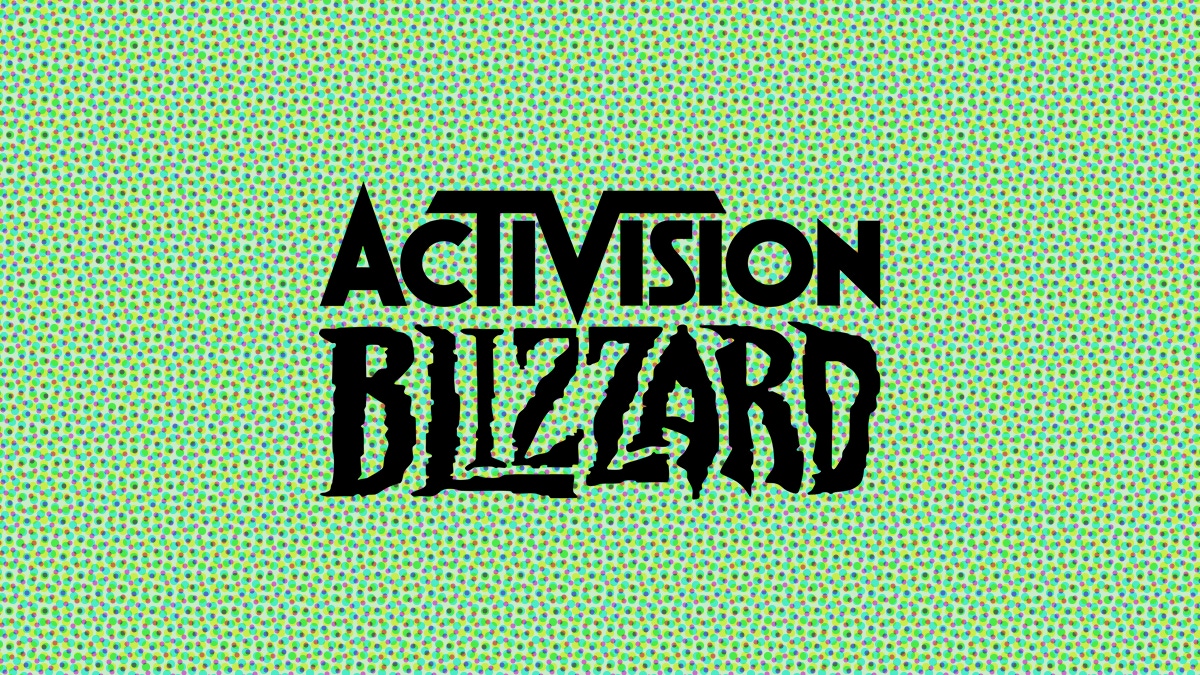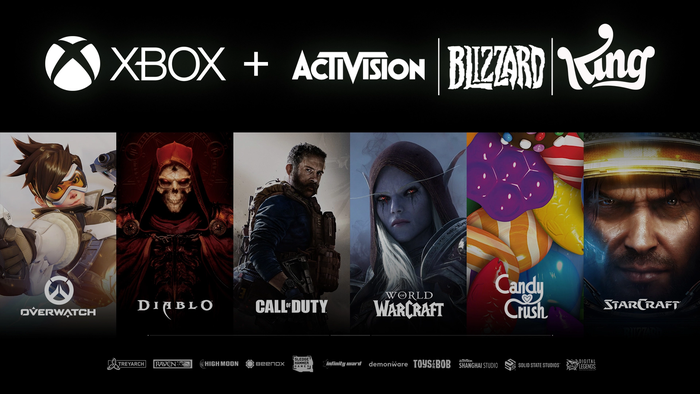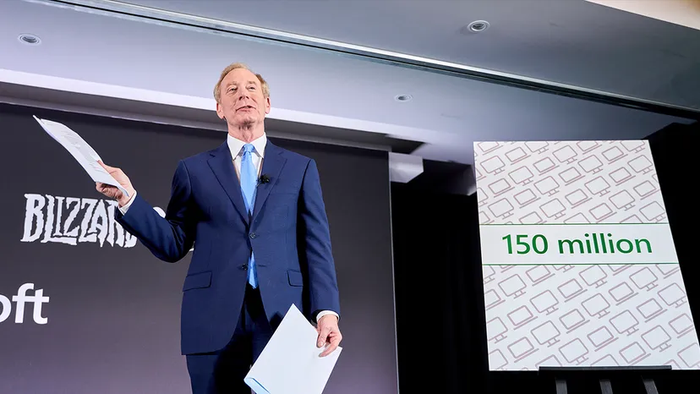Trending
Opinion: How will Project 2025 impact game developers?
The Heritage Foundation's manifesto for the possible next administration could do great harm to many, including large portions of the game development community.
A rolling rundown that explains what's going on with Microsoft's ongoing Activision Blizzard merger, detailing key headlines, the story so far, and where it could be heading next.

As of October 13, 2023, the deal has indeed closed, as Microsoft has completed its $68.7 billion acquisition of Activision Blizzard, meaning the Call of Duty and World of Warcraft publisher has officially been welcomed into the Xbox Game Studios family.
In our piece on the final moments and closing of the acquisition, we note the final hurdles Microsoft cleared, with the US Federal Trade Commission (FTC) and UK Competition and Markets Authority (CMA).
The FTC took Microsoft to court in the United States in a bid to block the deal but ultimately failed to convince a judge the merger would substantially lessen competition.
Microsoft countered those claims by signing a series of partnerships that would keep Call of Duty on rival hardware and cloud platforms owned by Nintendo, Sony, Nvidia and more for the next decade. Those public commitments undermined the FTC's case, with the judge overseeing proceedings suggesting "the record evidence points to more consumer access to Call of Duty and other Activision content."
The CMA, meanwhile, blocked Microsoft's original merger proposal over fears it would "alter the future of the fast-growing cloud gaming market." Despite that setback and a rather high-profile war of words between those parties involved, Microsoft sought to remedy the situation by agreeing to transfer Activision Blizzard's cloud gaming rights to French publisher Ubisoft for the next 15 years.
After making that commitment, Microsoft submitted a revamped proposal to the CMA. That new-look deal was approved by the UK regulator, which described it as a "game changer that will promote competition."
The finish line came into view for Microsoft after the Xbox maker triumphed against the Federal Trade Commission in court, paving the way for the company to push through its merger in the United States.
The victory came after the company spent months trying to convince regulators it's prepared to play nice with competitors, signing binding agreements with the likes of Nintendo, Nvidia, and other game streaming providers that will see Call of Duty and other Activision Blizzard franchises supported on rival platforms for the next decade (at the very least).
Sony initially pushed back when Microsoft offered a similar deal to the Japanese company, but recently accepted an offer to keep Call of Duty on PlayStation for the next decade after the FTC failed to convince a judge the merger will negatively impact consumers.
The deal has also been approved in other major regions. The EU, for instance, signed off on the acquisition and believes it will deliver a "significant improvement for cloud gaming as compared to the current situation" without significantly harming competition.

The colossal scale of Microsoft's Activision Blizzard deal might've caught some by surprise, but the writing has been on the wall for some time. The Xbox maker has thrown down the M&A gauntlet in recent years, taking charge of major franchises like Minecraft, Fallout, DOOM, The Elder Scrolls, and their respective developers in a deluge of deals worth billions.
The Xbox Game Studios family currently comprises 23 studios, and that number could rocket skyward if the company manages to seal its purchase of Activision Blizzard, with the deal potentially bringing mobile powerhouse King into the fold alongside numerous other studios–including publishing, tech, and QA divisions.
When announcing the deal, Xbox boss Phil Spencer expressed hope the move will help usher in a future where "people can play the games they want, virtually anywhere they want," referencing the company's push into the world of subscription-based, play-anywhere gaming via services like Xbox Game Pass and Xbox Cloud Gaming.
If completed, the deal will significantly bolster Microsoft's first-party credentials, inducting key franchises like Call of Duty and major studios such as Blizzard Entertainment, Infinity Ward, and Sledgehammer Games into the Xbox Game Studios family. The move isn't purely about expanding Microsoft's console game and cloud streaming offerings, though.
Speaking on The Verge's Decoder podcast in November 2022, Xbox chief Phil Spencer suggested the acquisition would allow the company to become a major player within the mobile industry. During the chat, Spencer said that Microsoft is currently "irrelevant" on mobile, noting that "anybody who picks up their phone and decides to play a game would see that on their own."
It was a pretty candid appraisal from Spencer, and while it would be far-fetched to suggest that Microsoft is purely focused on nabbing Candy Crush developer King, there's no denying that the move would provide a huge shot in the arm to Microsoft's mobile game business.

Brad Smith, holding the 10-year contract offered to Sony ensuring access Activision Blizzard games, including Call of Duty (Photo by Nicolas Peeters/Melting Prod)
Microsoft's recent deals with Nintendo and Nvidia, the latter of which will see it bring Xbox PC games to Nvidia's streaming service, managed to convince EU regulators that it's prepared to play nice with its rivals. Sony has now also accepted a 10-year binding agreement that will see Call of Duty remain available on PlayStation platforms should the merger be completed.
After successfully pushing back agains U.S. regulator the FTC in court, Microsoft looks set to complete the deal in the United States. It also remains in discussions with UK regulator the CMA, which chose to block the deal earlier this year, about how it might tweak the merger to seal approval.
With those conversations still ongoing, Microsoft and Activision Blizzard agreed to extend their merger agreement deadline by three months until October 18, 2023, to allow them to clear any final regulatory hurdles and bring the merger home.
As of October 13, 2023, the deal has closed.
–January 18, 2022 // Microsoft buying Activision Blizzard in $68.7B deal
Microsoft announced that it would be purchasing Call of Duty and World of Warcraft developer Activision Blizzard in a gigantic acquisition. Notably, the company said Bobby Kotick would "continue to serve as CEO" of Activision Blizzard.
–April 28, 2022 // Activision Blizzard shareholders approve Microsoft acquisition offer
Activision Blizzard shareholders overwhelmingly voted to approve Microsoft's $68.7 billion acquisition offer. The investors who controlled 98 percent of shares in the company collectively gave a thumbs-up to the proposed transaction, letting it advance to the regulatory approval stage.
–June 13, 2022 // Microsoft signs labor neutrality agreement with CWA
Microsoft entered into a labor neutrality agreement with Communications Workers of America (CWA), the largest media labor union in the United States, ahead of its high-profile Activision Blizzard acquisition. The agreement will only take effect at Activision Blizzard 60 days after Microsoft's acquisition closes, but will allow workers to "freely and fairly make a choice about union representation." It was a move that brought the CWA on side.
–August 22, 2022 // Saudi Arabia voices "no objection" to Microsoft's Activision Blizzard acquisition
Saudi Arabia's General Authority for Competition became the first regulatory body to approve the $68.7 billion acquisition, with the agency declaring it had "no objection to completing the process of economic concentration between Microsoft Corporation [and] Activision Blizzard, Inc."
–September 01, 2022 // UK regulator says Microsoft's Activision Blizzard deal could "harm rivals"
The Competition and Markets Authority (CMA), the UK's competition regulator, said Microsoft's planned $68.7 billion acquisition of Activision Blizzard could harm its rivals, and suggested it could investigate the deal further.
–September 15, 2022 // Xbox's Activision Blizzard deal to get in-depth probe by UK regulators
"On the information currently available to it, it is or may be the case that this Merger may be expected to result in a substantial lessening of competition within a market or markets in the United Kingdom," wrote the CMA, announcing its intention to probe the merger.
–October 06, 2022 // Brazil gives Microsoft-Activision acquisition its full restriction-free approval
Brazilian regulator, the Administrative Council for Economic Defense (CADE), granted the merger its "unrestricted approval," becoming the second global regulatory agency after Saudi Arabia in August to sanction the acquisition.
–October 19, 2022 // Microsoft says UK regulator's concerns over Activision Blizzard deal are "misplaced"
Microsoft responded to UK regulator the CMA by describing its concerns as "misplaced. The Xbox maker said the CMA's overarching concern that the merger will allow it to drive competitors out of business is "unsupported" and based on "self-serving statements by Sony."
–November 08, 2022 // EU announces investigation into Microsoft's Activision Blizzard deal
The European Union announced its own plans to conduct a full investigation into Microsoft's bid for Activision Blizzard, and said that by purchasing the Call of Duty publisher, Microsoft could gain the ability to "foreclose access to Activision Blizzard's console and PC video games, especially to high-profile and highly successful games."
–November 23, 2022 // Sony fears impact of Microsoft acquisitions on PlayStation business
In a letter to the CMA, Sony pushed back against the merger and said it would be at risk of "losing significant revenues" if Microsoft was allowed to become the owner of franchises such as Overwatch and Call of Duty.
–December 07, 2022 // Microsoft pledges to bring Call of Duty to Nintendo platforms
In an apparent attempt to ease regulatory concerns, Microsoft committed to bringing Call of Duty to Nintendo platforms for the next decade if its acquisition of Activision Blizzard is approved.
–December 08, 2022 // The FTC sues Microsoft to block its Activision Blizzard merger
U.S. regulator the Federal Trade Commission announced plans to block the merger on the basis that it would harm competition. "Today we seek to stop Microsoft from gaining control over a leading independent game studio and using it to harm competition in multiple dynamic and fast-growing gaming markets," wrote the FTC's Bureau of Competition director, Holly Vedova, at the time.
–December 23, 2022 // Microsoft and Activision Blizzard respond to FTC's acquisition lawsuit
Both Microsoft and Activision Blizzard responded to the FTC's lawsuit, and suggested the regulator's belief that the deal would somehow disrupt the game industry was misguided. "The acquisition of a single game by the third-place console manufacturer cannot upend a highly competitive industry, particularly so when the manufacturer has made clear it will not withhold the game," wrote Microsoft at the time.
–January 05, 2023 // UK regulator extends deadline for investigation into Activision Blizzard deal
With the debate surrounding the merger heating up, the CMA extended the deadline for responses to its investigation into the deal to March. It also moved the statutory deadline to publish its final report into the potential risks of the deal to April 26, 2023.
–January 23, 2023 // Microsoft looks to Sony for help in its defense against FTC lawsuit
Microsoft decided to subpoena its competitor in the hopes of building a defense against the FTC, asking for details about the scope of Sony's game production in a bid to prove the PlayStation maker is the current market leader.
–January 30, 2023 // Microsoft claims Sony is misleading EU regulators
A week later, Microsoft accused Sony of misleading EU regulators over the potential impacts of the deal, with Microsoft communications lead Frank X. Shaw suggesting Sony had been wrongly telling people in Brussels that the Xbox maker would be unwilling to offer parity for Call of Duty if the merger was approved.
–February 08, 2023 // UK regulator knocks back Microsoft's Activision Blizzard deal
Publishing the provisional findings of its investigation into the merger, the CMA said it believed the move would harm Microsoft's rivals and "result in a substantial lessening of competition." Proposing solutions, the CMA indicated it might be willing to approve the deal if Activision Blizzard was divested
–February 21, 2023 // CWA wants European Commission to approve Microsoft-Activision merger
The CWA continued to encourage regulators to back the merger, with group president Chris Shelton asking the European Commission to approve the deal between the two game publishers because it would "help make history in rebalancing power in labor markets."
–February 21, 2023 // Microsoft signs "binding" contract to bring Call of Duty to Nintendo platforms
Microsoft set its 10-year agreement to bring Call of Duty to Nintendo platforms in stone, signing a "binding" contract with the Switch maker that will give it continued access to the franchise should the deal gain approval.
–February 22, 2023 // Microsoft: Sony "hoping the future never arrives" by opposing Activision Blizzard deal
During press conference in Brussels, Microsoft vice chair and president Brad Smith said the company has yet to reach an agreement with Sony where Call of Duty is concerned, but suggested the company is simply "hoping the future never arrives" by opposing the merger.
–March 02, 2023 // Microsoft granted access to internal Sony documents as part of FTC lawsuit
Sony's bid to quash or limit a subpoena it was served by Microsoft as part of the latter's ongoing legal battle with U.S. regulator the Federal Trade Commission was denied in part, and granted in part, giving Microsoft access to some crucial documentation, including select files from Sony's in-house antitrust lawyer, Greg McCurdy
–March 02, 2023 // Report: EU to approve Activision Blizzard merger after Microsoft licensing blitz
Reuters reported that Microsoft's willingness to offer licensing deals to rivals such as Nintendo and Sony might've persuaded EU regulators to approve its Activision Blizzard merger. The company has since followed up those deals by penning similar 10-year partnerships with cloud game platforms including Nivida GeForce Now, Boosteroid, and Ubitus.
–March 24, 2023 // UK regulator no longer thinks Microsoft is buying Activision Blizzard to make Call of Duty exclusive
The Competition and Markets Authority has narrowed its "scope of concerns" and is now convinced Call of Duty won't become an Xbox exclusive should Microsoft complete the deal, potentially paving the way for the deal to be approved in the UK.
–March 28, 2023 // Japanese regulator JFTC won't block Microsoft's Activision Blizzard acquisition
Japanese regulator the JFTC reviewed the deal and concluded it's "unlikely to result in substantially restraining competition in any particular fields of trade."
–April 26, 2023 // UK regulator blocks Microsoft's Activision Blizzard deal over cloud concerns
UK regulator the Competition and Markets Authority (CMA) has blocked Microsoft's proposed Activision Blizzard merger over fears the deal will "alter the future of the fast-growing cloud gaming market." Microsoft and Activision Blizzard confirmed they will appeal the decision.
–May 15, 2023 // Microsoft's proposed Activision Blizzard merger seals EU approval
EU regulators approved Microsoft's proposed Activision Blizzard merger and claimed the deal "represents a significant improvement for cloud gaming as compared to the current situation."
–May 25, 2023 // Microsoft files appeal against CMA block on Activision Blizzard merger
In response to the CMA's block on the merger in April, Microsoft's now filed an appeal with the Competition Appeal Tribunal (CAT) to push its merger with Activision Blizzard through.
–July 11, 2023 // Microsoft wins FTC trial, can proceed with Activision Blizzard merger
With the FTC's preliminary injunction denied, Microsoft can close its deal for Activision Blizzard before its deadline hits next week.
–July 14, 2023 // CMA delays Microsoft-Activision verdict as FTC appeal gets denied
Microsoft has been granted extra time to close the deal in the UK after informing the CMA it has made "detailed and complex" tweaks to its proposed merger.
–July 17, 2023 // Sony accepts Microsoft's offer to keep Call of Duty on PlayStation for a decade
Microsoft and Sony have signed a binding agreement to keep Call of Duty on PlayStation after the Xbox maker has acquired Activision Blizzard.
–July 19, 2023 // Microsoft and Activision Blizzard extend merger deadline until October
Microsoft has extended its merger agreement deadline with Activision Blizzard and now has until October 18, 2023, to complete its $68.7 billion acquisition of the Call of Duty publisher.
–July 21, 2023 // FTC suspends administrative challenge to Microsoft's Activision Blizzard deal
The Federal Trade Commission suspended its administrative challenge to Microsoft's $68.7 billion acquisition of Activision Blizzard.
-October 13, 2023 // Activision Blizzard joins Xbox after Microsoft completes seismic acquisition
Xbox boss Phil Spencer said the two companies will work together as "one team" to bring the "joy and community of gaming to more people."
[Updated on October 13, 2023 ]
You May Also Like